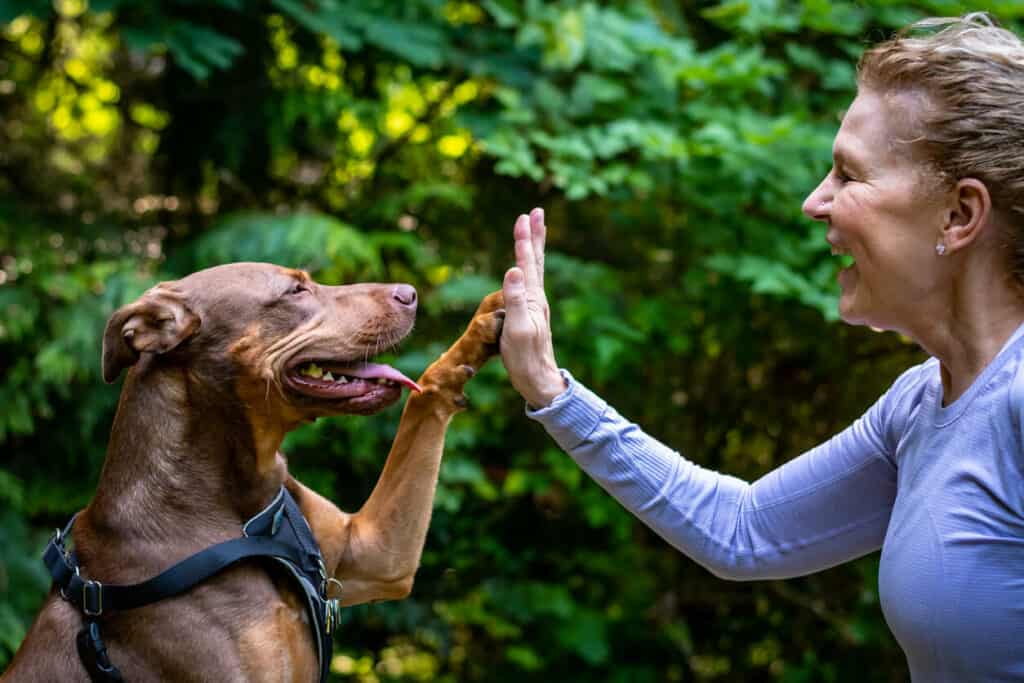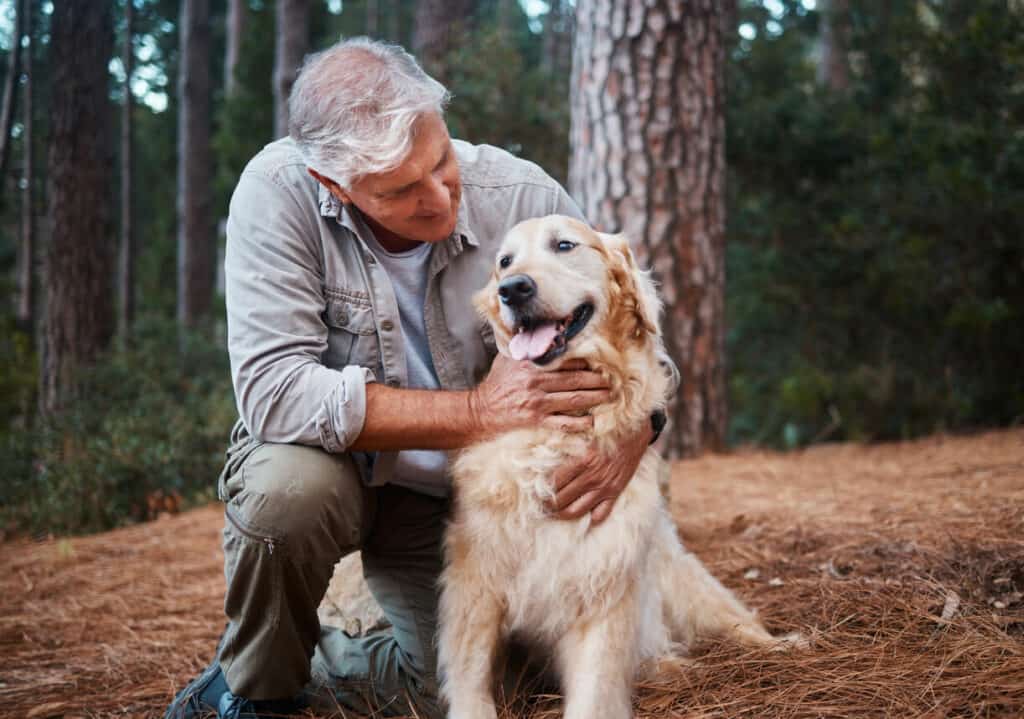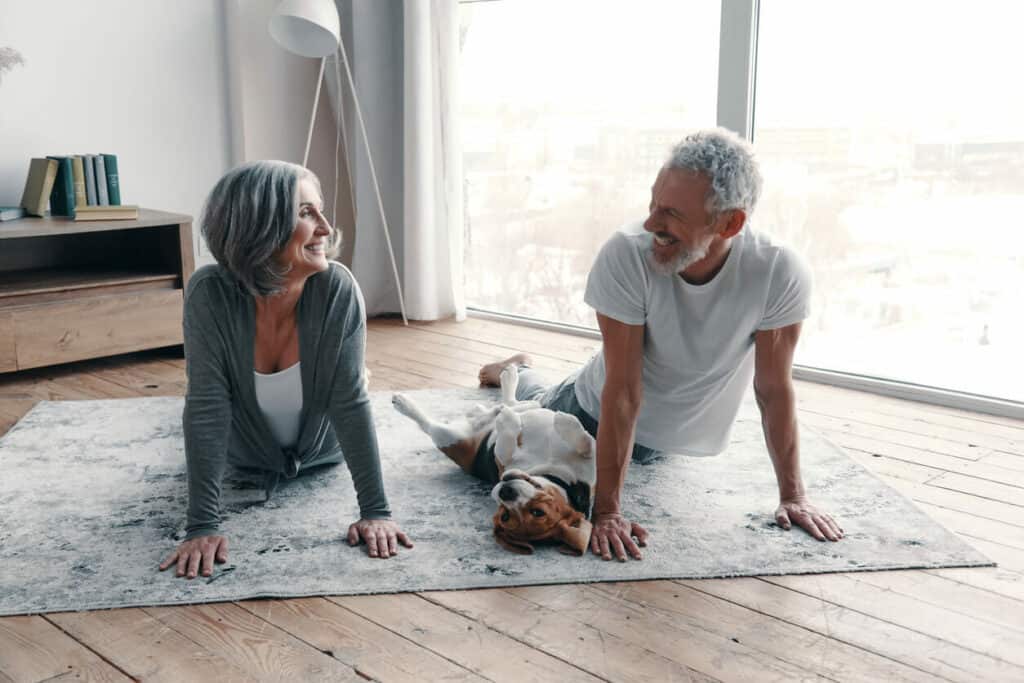
In 2023, news of a new and helpful treatment for Parkinson’s disease came to light, and it involved man’s best friend. Dogs are being trained to detect early signs of the disease in their owners, and may soon become a common and well-respected part of the health community. With a keen sense of smell and a willingness to learn, these furry friends can be taught to detect the disease in its early stages, allowing for earlier treatment and better outcomes.
Resources and training programs have been set up to help owners find and train dogs for this important task. Many families have shared their success stories with these dogs, who have become beloved members of their family and support network.
When your aging loved one has Parkinson’s disease, one thing to note is that this is a chronic and progressive condition. They will suffer some symptoms due to this condition over time. Each person experiences these symptoms differently, varying in severity.
Parkinson’s illness affects a loved one’s capacity to lead a normal life. Parkinson’s disease patients will require assistance with their daily living tasks, such as eating, bathing, grooming, and even walking.
Yet it would be beneficial if you didn’t give up because effectively managing these symptoms will ensure that your loved one lives a good life. The followings are some of the symptoms and warning signals you should watch out for:
- Tremors
- A shift in speech
- some automatic movements are lost
- declining motor abilities.
Understanding The Use Of A Parkinson’s Dog In The Lives Of A Loved One
Knowing that Parkinson’s disease is a neurological condition caused by insufficient dopamine production will help you better grasp what is happening to your loved one. The progression of this illness is gradual. Dopamine chemicals enable your body and brain to communicate and control each other throughout the brain.
Due to the progressive nature of Parkinson’s disease, you will understand that your loved one’s illness will be unique to them. Most symptoms will appear gradually, so you must be ready to support them in leading fulfilling lives.
Scientists and researchers have not yet found a cure. As a result, it is up to you to ensure that your loved one has a good life while they search for a cure. You can talk with their doctor about alternative treatments that result in a more contented life. The following are a few available alternative treatments:
- Make sure your older relatives have a balanced diet.
- They work out frequently.
- obtaining a service dog for Parkinson’s.
You may relax knowing your loved one has a service dog for Parkinson’s. You may feel anxious when you leave a loved one alone, but with the help of a service dog, you probably won’t feel as anxious.
Those cared for by a Parkinson’s dog will experience a good life change. When your loved one experiences mobility problems, loneliness, or cannot perform certain activities, having a service dog will help them with some of these challenges.
In this article, we shall investigate some benefits of getting a Parkinson’s dog for you and your loved one.

The moment your loved one receives a Parkinson’s disease diagnosis from their doctor, you become aware that they can have moments of anxiety or depression.
A Parkinson’s service dog is trained specifically to help your loved one, which is a benefit of having one with them. As a result, you should take the needs of the Parkinson’s disease patient into account before bringing in a service dog. By doing this, you can be sure the dog will improve their quality of life.
Advantages of Acquiring a Service Dog for Parkinson’s
A service dog will provide its handler with a great deal of comfort and will also aid in reducing anxiety and sadness. Your loved ones will feel better and will be more at ease when in the company and love of their service dog.
Encourage a Parkinson’s Disease Patient to Exercise

The American Parkinson’s Disease Association (APDA) claims frequent physical activity and exercise are essential for PD patients. A service dog will help your loved one with their exercises, which may include these benefits:
- Reducing the rate of Parkinson’s disease progression
- Enhancing their strength, balance, and gait
- Enhancing their mood Facilitates healthier sleep habits
- Improving their quality of life
- Enhancing PD non-motor symptoms such as apathy, depression, and exhaustion.
Assistance in Retrieving Medication, Water, and Other Things for Your Loved One That Is Out of Reach
You can point out an object and ask the Parkinson’s service dog to pick it up. It will then return this object to its handler. To make their life easier, your loved one can direct the service dog to get and deliver the item.
Fetching Someone For Assistance if Its Handler Is In Distress
When a service dog detects its handler is in trouble, it will run and call for help. This action is essential, especially if your loved one struggles with balance. Also, it will let you know if your elderly relative is in trouble and might need immediate medical attention.
Warding Off Strangers from Your Loved One, Especially When They Are in Distress

In the presence of strangers, a Parkinson’s service dog will detect whether its handler is in danger or alarmed.
Switching On and Off Lights and Opening Doors
Allow the service provider to train the service dog in the areas where your loved one needs assistance when you obtain a service dog for them. Two examples of this are opening doors or turning on and off the lights. Your loved one will feel better knowing they do not have to rely only on you if you carry out these necessary but simple tasks.
Especially if they are your parents, I am sure you want to support them and improve their quality of life. But, you should be aware that even while it is an honor to aid someone, there are occasions when that person may feel that they are burdening you, which can cause tension and despair. They will be able to maintain some of their independence and sense of control over their lives with the aid of service dogs.
Provide Companionship
When you have a service dog for Parkinson’s, it will provide companionship to your loved one. Thus companionship will help them in fighting loneliness and depression as they have a positive impact on their lives. Dogs will always be beside your loved ones, ensuring they are not alone. Your loved one can also talk while the dog listens. A dog is a good listener; the best part is that it will not judge; this can help its handler offload any emotions that bother them.

Provide Physical Assistance
Your loved one will get assistance with movement from a well-trained Parkinson’s service dog, whether they need it to sit, get out of a wheelchair, or walk.
Help in Boosting Your Loved One’s Confidence
Depression brought on by a Parkinson’s diagnosis may arise from low self-esteem. Interacting with a service dog can help your loved one overcome poor self-esteem and increase their confidence. They will grin more frequently due to having a dog, which will improve their mood and those of others around them.
- applying physical contact to the Parkinson’s patient to calm them
- assisting a loved one with dressing or undressing
Finding a Parkinson’s Dog For Your Aging Loved One
The next step is to acquire a service dog for your loved one after choosing one for them. Given that these dogs are professionally trained to support a person and carry out specific tasks, making their handler’s life easier and more comfortable, you realize a service dog is not the same as a pet.
Even though a service dog is not a pet, it needs love and care. Make careful you love and care for the dog, regardless of whether it is working.
You must fulfill certain conditions to obtain a service dog for a Parkinson’s patient in accordance with the Americans with Disabilities Act (ADA). These requirements include:
- Possess a physical or mental impairment that makes daily living difficult
- Demonstrate how a service dog for Parkinson’s disease will help your loved one’s condition.
- Have the doctor of your loved one suggest or request a service dog.
- Maintain a stable home environment
- Your elderly parent must be present when the Parkinson’s service dog is being trained
- Be able to support the service dog financially
- The service dog must be trained and taken care of by your loved one.
What Takes Place If Your Loved One Does Not Comply With All the Criteria to Own a Service Dog for Parkinson’s Disease?
Even if your loved one would certainly benefit from a service dog, there are times when they may not qualify for one. The greatest action would be not to lose hope because your loved one can still have a dog to assist them. However, they will not benefit from the services of a Parkinson’s dog but from a dog that provides emotional support.
In this situation, you only need a recommendation or letter requesting an emotional support dog from the physician treating your loved one. This letter demonstrates that an emotional support dog is necessary for your loved one’s care.
Reach Out For Help
If you’re interested in learning more about Parkinson’s dogs and how these dogs could benefit your life or the life of a loved one, and navigate to the resources menu for helpful information. Together, we can help find new ways to treat and manage diseases like Parkinson’s, and our pets are an important part of that effort.
We at Amy’s Eden recognize your want to see your aging parents flourish despite a Parkinson’s disease diagnosis. We believe in providing the highest quality care for everyone involved. Therefore our caregivers are prepared to assist you in any way we can.
You could experience emotional overload occasionally, especially after learning that a loved one has Parkinson’s disease from their doctor. You should know you are not alone since we can lend you a shoulder if you need one.




